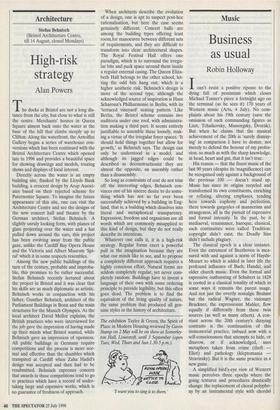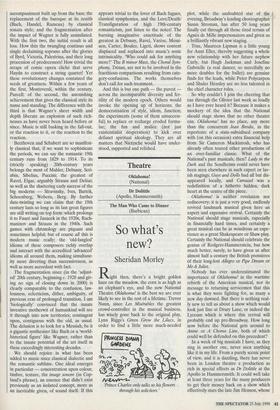Music
Business as usual
Robin Holloway
Ican't resist a positive riposte to the dying fall of pessimism which closes Michael Tanner's piece a fortnight ago on the terminal (as he sees it) 170 years of Western music (Arts, 4 July). No com- plaints about his 19th century (save the omission of such commanding figures as Liszt, Tchaikovsky, Mussorgsky, Dvorak). But when he claims that the musical achievement of the 20th is 'surely dismay- ing' in comparison I have to demur, not merely to defend the honour of my profes- sion, so much as with the sharp knowledge, in head, heart and gut, that it isn't true.
His reason — that the finest music of the last 90 years (despite its 'magnificence) can be recognised only against a background of the previous 100 — doesn't stand up. Music has since its origins recycled and transformed its own constituents, enriching or refining, altering emphases, tending here towards euphony and perfection, there towards gargoyles of mannerism and strangeness, all in the pursuit of expressive and formal intensity. In the past, be it mediaeval, renaissance, baroque, classical, such continuities were called Tradition: copyright didn't exist, the Deadly Sins didn't include plagiary.
The classical epoch is a clear instance. Even the extremest of Beethoven is mea- sured with and against a norm of Haydn- Mozart to which is added in later life the profound influence of Bach, Handel, and older church music. Even the formal and expressive outbursting of Schubert in 1828 is rooted in a classical tonality of which in some ways it remains the purest usage. And not just the overtly nostalgic Brahms but the radical Wagner, the visionary Bruckner, the expressionist Mahler, flow equally if differently from these twin sources (as well as many others). A con- stant across the 20th century's dizzying contrasts is the continuation of this immemorial practice, imbued now with a self-consciousness that attempts to hide, or disavow, or if acknowledged, uses metaphors taken from crime (theft — Eliot) and pathology (kleptomania -- Stravinsky). But it is the same practice in a new guise.
A simplified bird's-eye view of Western music perceives three epochs where the going textures and procedures drastically change: the replacement of choral polypho- ny by an instrumental style with chordal accompaniment built up from the bass; the replacement of the baroque at its zenith (Bach, Handel, Rameau) by classical sonata style; and the fragmentation after the impact of Wagner is fully assimilated. With the first two, the initial result is all loss. How thin the twangling continuo and single declaiming soprano after the glories of Byrd, Victoria, Palestrina, and their long procession of predecessors! How trivial the scraps of comic opera cliché that serve Haydn to construct a string quartet! Yet these revolutionary changes contained the seeds of greatness. Within a few years of the first, Monteverdi, within the century, Purcell: of the second, the astonishing achievement that gives the classical style its name and standing. The difference with the third is that Wagner's sheer width and depth liberate an explosion of such rich- nesses as have never been heard before or since. Music is still basking in the fall-out, or the reaction to it, or the reaction to the reaction.
Beethoven and Schubert are so manifest- ly classical that, if we want to sophisticate the periods, we can say the romantic 19th century runs from 1829 to 1914. To its (strictly speaking) 20th-century years belongs the most of Mahler, Debussy, Scri- abin, Sibelius, Puccini; the greatest of Ravel, Elgar, arguably Strauss and Delius; as well as the shattering early success of the big modems — Stravinsky, Ives, Bartok, Schoenberg, Webem, Berg. By further date-twisting we can claim that the 19th century lasts so long as its last great figures are still writing on top form: which prolongs it to Faure and Janacek in the 1920s, Rach- maninov and Strauss in the 1940s. Such games with chronology are piquant and sometimes helpful; but of course all this is modern music really; the 'old-fangled' idioms of these composers richly overlap and interact with the accredited 'advanced' idioms all around them, making simultane- ity more diverting than successiveness, as well as more accordant with fact.
The fragmentation since (in the 'adjust- ed' 20th century, beginning c. 1920 and giv- ing no sign of closing down in 2000) is clearly comparable to the confusion, law- lessness, eclecticism, dither, ambiguity, of previous eras of prolonged transition. I am 'biologically' convinced that the innate inventive motherwit of humankind will see it through into new territories; contingent upon, contiguous with the old, as usual. The delusion is to look for a Messiah, be it a gigantic synthesiser like Bach or a 'world- historical figure' like Wagner, rather than to the innate potential of the art itself in these exceedingly interesting decades.
We should rejoice in what has been added to music since classical dialectic and the romantic sublime. One ideal emerges in particular — concentration upon colour, timbre, texture, the image sonore (in Cop- land's phrase), an essence that didn't exist previously as an isolated concept, more as an inevitable given, of sound itself. If this appears trivial to the lover of Bach fugues, classical symphonies, and the Love/Death/ Transfiguration of high 19th-century romanticism, just listen to the notes! The burning imaginative exactitude of the greatest in Debussy, Ravel, Varese, Messi- aen, Carter, Boulez, Ligeti, shows content displaced and replaced into music's sonic intrinsicality. 'Who could ask for anything more?' The B minor Mass, the Choral Sym- phony, Tristan, are not to be involved in the fractitious comparisons resulting from cate- gory-confusions. The works themselves don't call for such treatment.
And this is but one path — the purest — across the incomparable diversity and fer- tility of the modem epoch. Others would invoke the opening up of horizons; the democratisation of style, idiom, function; the experiments (some of them unsuccess- ful) to replace or recharge eroded formu- lae; the fun and malice (not just existentialist desperation) to kick over defunct spiritual ideology. They are all matters that Nietzsche would have under- stood, supported and relished.



























































 Previous page
Previous page